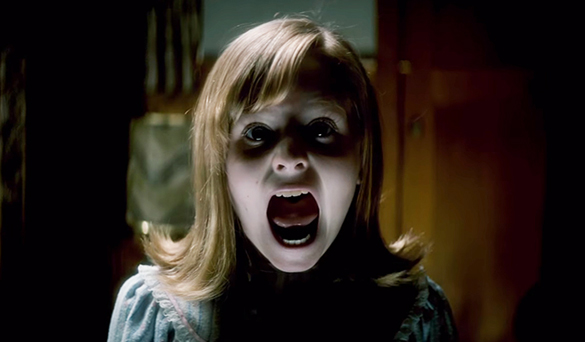Ouija: Origin of Evil ***

Never mind the creepy board that allegedly can communicate with the departed, trying to figure out who is alive and who is technically ‘dead’ in the last part of Ouija: Origin of Evil is confusing and consuming enough for anyone watching – if you haven’t seen the 2014 film, Ouija, that is.
Also, let’s face it; self-assured children are always a tad creepy too, like cute Doris Zander, played here by Lulu Wilson, who channels something demonic through her tiny frame. Wilson is quite brilliant in co-writer-director Mike Flanagan‘s new film, and rather than relying on effects, it’s actually Wilson who carries many scenes to their devilish end.
It’s 1965 in LA, and widowed mother Alice Zander (Elizabeth Reaser) is trying to keep a roof over Doris’s and older teenage daughter Lina’s (Annalise Basso) heads by practicing mediumship. Alice and the girls use tricks of the trade to complete the deception that spirits are talking to them. After buying a ‘new prop’, an Ouija board, little Doris starts acting strangely and hearing the dead, including their dearly departed father. However, something more sinister is trying to use Doris as a vessel to do its dirty work.
There are all the usual horror tropes, complete with gloomy, haunted house set, but something more self-assertive this time around. There is a mockery of the supernatural coupled with a degree of respect that Flanagan gives nods to in the script. The fact his characters openly ‘joke’ about it in the dialogue brings light relief too. This film takes itself less seriously than the 2014 film did.
What it does not poke fun at is grief, which plays a big factor. It’s clear the Zanders are struggling to cope with that ‘hole’ and that empathy at their loss brings you right onto their side and condones what they are doing to survive. However, we don’t get a sense of Alice’s consuming madness, mentioned in the first film by a grown-up Lina (played by Lin Shaye). That’s probably because things get a little crazy and confusing at the end – all we know is the men are expendable in the process. This is about female power.
Flanagan’s horror is not so much about the special effects rather than the characters, relying on old-school scares. There is also an assumption that the audience has prior knowledge of Ouija and its implied effects. With that pre-planted, it doesn’t take much of the imagination to let events run organically, before the effects kick in – it’s just events get very complex.
Still, Ouija: Origin of Evil has enough eyeball rolling and gymnastics to satisfy the horror fan. Of course the house has something lurking in the basement – wouldn’t be a demonic fest without it. The performances make it stand out though, and enough triggers to our imagination to make it an effective watch, especially approaching Halloween.
3/5 stars
By @FilmGazer